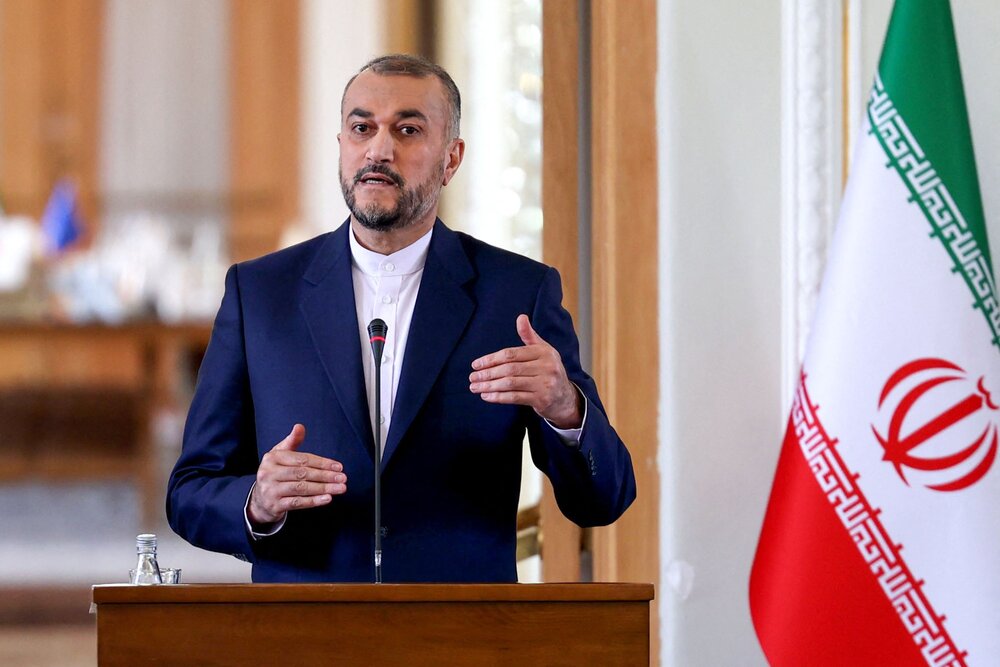Iran FM discusses JCPOA with Borrell, Ukraine war with Guterres
‘EU’s strategic goals have fallen victim to false information provided by ill-wishers’

TEHRAN- In separate phone calls with European Union foreign policy chief Josep Borrell and UN Secretary General Antonio Guterres on Friday, Iranian Foreign Minister Hossein Amir Abdollahian exchanged views on various issues, including the latest issues surrounding the 2015 Iran nuclear deal – JCPOA - as well as the newest developments in the Ukraine conflict.
The Islamic Republic's cooperation with the International Atomic Energy Agency (IAEA) and the talks in Vienna intended to lift the anti-Iran sanctions and return to the JCPOA were subjects of conversation between Amir Abdollahian and Borrell.
The talks to revive the nuclear deal, officially called the Joint Comprehensive Plan of Action, started in April last year. However, after many rounds of talks mediated by the EU the talks have stalemated to the intransigence by the U.S. which quit the agreement in 2018 under the leadership of Donald Trump.
Amir Abdollahian praised Borrell's contribution to laying the foundation for dialogue and negotiation but derided a few European ministers for acting in an undiplomatic manner, saying “radical” politicians today often use the EU as a cover to abuse the bloc’s good moniker.
As a result of such a conduct, the “strategic objectives” of the EU have been given an edge as violent offenders and even terrorist groups give these politicians false information, the Iranian foreign minister added.
The top diplomat also emphasized how crucial it is for Borrell as the High Representative of the European Union for Foreign Affairs and Security Policy to play a role in steering clear of the bloc from engaging in such destructive sentiments.
For his turn, Borrell highlighted his efforts to exhort the parties to the Vienna talks to adhere to their JCPOA obligations, stressing that he will continue his contacts to set the stage for achieving an understanding in this regard.
“Claims of Iran’s arms delivery to Russia intended to arm Ukraine”
In his talks with the UN chief, Amir Abdollahian also rejected charges that Iran had sent weapons to Russia for use in the Ukraine war. Amir Abdollahian maintained that such assertions were made to justify the West's military support for Kiev.
Amir Abdollahian also said the continuous war between Russia and Ukraine is a result of NATO's failed policies, including its eastward expansion.
Russia which started a war on Ukraine on February 24 is still continuing.
The senior Iranian diplomat reaffirmed Tehran’s opposition to arming the warring sides, saying that doing so would only result in greater casualties and expenses for both sides.
He declared that Tehran will keep up its efforts to avert conflict and advance enduring peace in Europe.
Russia and Iran have both vehemently refuted allegations that Tehran sent Moscow drones to use in the conflict in Ukraine.
In July, U.S. National Security Advisor Jake Sullivan made the first anti-Iran allegations, claiming that Washington had "information" indicating that the Islamic Republic was getting ready to give Russia "up to several hundred drones, including weapons-capable UAVs on an expedited timeline" for use in the conflict.
Last month, the Iranian foreign minister downplayed media speculation on Iran's purported backing for Russia in the Ukraine war, saying Tehran had given Moscow a small number of drones months prior to the conflict in Ukraine.
In addition, he vowed that Iran would not stand by idly if it were established that Russia had utilized Iranian drones in the struggle.
“West exploiting protests in Iran”
Elsewhere in his remarks, Amir Abdollahian said it is for more than two months that the United States and several other Western countries have exploited unrest in Iran through a disinformation campaign and manipulation of international institutions to incite violence in Iran.
He suggested that diplomacy and dialogue are the best means to address issues, but the Islamic Republic's hands are not shackled in the face of alternative options, openly referring to the West's sanctions against Tehran over the current upheaval under the pretext of human rights violations.
In a statement issued on Saturday, the Iranian Interior Ministry’s State Security Council put the number of people killed in Iran since the tragic death of Mahsa Amini at 200.
Violent protests erupted in the middle of September after Mahsa Amini, a 22-year-old woman, fainted at a Tehran police station and died three days later in hospital.
Iranian Legal Medicine Organization's official assessment found that Amini's death was brought on by disease rather than claimed blows to the skull or other important body parts.
As Western nations offered backing, rioters went on rampage, assaulting security personnel and damaging both public and private property.
In response to the European Union's purposeful efforts in favor of riots Iran declared punitive penalties against organizations and individuals in the EU.
On Thursday, President Ebrahim Raisi said the foes committed a "scandalous miscalculation" by inciting the recent protests in Iran. However, he said, the Iranian people foiled their plots to sow discord and turmoil in the country.
Guterres hopes Iran’s effort will help end Ukraine war
For his part, the UN chief praised Iran's positive leverage on regional affairs and expressed optimism that Tehran's efforts will culminate in the conclusion of the war in Ukraine and implementation of a ceasefire.
According to Guterres, dialogue and diplomacy are effective strategies to resolve regional and global problems, underscoring the significance of Iran's ongoing efforts to politically settle the Yemeni crisis.
The JCPOA and Iran's collaboration with the IAEA were other topics of discussion between the Iranian foreign minister and the head of the UN.
Leave a Comment